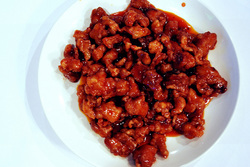
I love General Tso, he was a brilliant commander and made delicious chicken. Whenever I go out to eat Chinese food I am faced with a dilemma, (first world problem) do I order General Tso's chicken, my favorite dish that I can depend on, or do I try something new and experiment with something I have never tasted before? I have the same issue with music, when I drive home do I listen to classic rock, my old reliable favorites or do I try out new songs I have never heard before?
The same dilemma is manifest in this week’s parsha where we learn the details of the Yom Kippur service. A full tractate in the Talmud called Yoma delineates the procedures in the parsha regarding the services that took place on Yom Kippur. The Talmud states (1) that one is not able to hear the High priest reading the Torah and watch the burning of the He goat and Ox. You cannot do both because the distance between the two prevents you from seeing both because they are at the same time. One event is intellectual the other is experiential; you cannot do both at the same time.
The tension of what Chinese food dish to order and where to go during the Yom Kippur service was identified by Werner Heisenberg. In his uncertainty principle (2). Professor Heisenberg states that the sharper and more precise we know one measurement (for example- Position) the more blurry or uncertain another measurement becomes ( for example - Momentum ) when measuring properties of a particle known as complementary variables.
If we spend all of our time in the study hall we will not have time to do chessed (acts of kindness). If we are constantly doing chessed we will not be able to develop our intellectual abilities.
One solution to my dilemma is to order General Tso's every other Chinese dinner. As long as I am aware of the need to expose myself to new dishes, to always having new experiences, I can grow. We engage with this dilemma during the Pesach seder. If we over analyze and intellectualize every aspect of the seder we rob it of its beauty, its emotional experiential aspects.Singing and dancing, the tastes the smells all play a role in the Sader experience. . Similar to my General Tso’s solution , I like to switch off , one Sader for analysis one for experience. Perhaps that is why we have two Sedurim every year, one for the head and one for the heart.
Other Links from the Dvar Torah
1. Mishnah Yoma : Perek 7 Mishnah 2
2. Uncertainty Principle
The same dilemma is manifest in this week’s parsha where we learn the details of the Yom Kippur service. A full tractate in the Talmud called Yoma delineates the procedures in the parsha regarding the services that took place on Yom Kippur. The Talmud states (1) that one is not able to hear the High priest reading the Torah and watch the burning of the He goat and Ox. You cannot do both because the distance between the two prevents you from seeing both because they are at the same time. One event is intellectual the other is experiential; you cannot do both at the same time.
The tension of what Chinese food dish to order and where to go during the Yom Kippur service was identified by Werner Heisenberg. In his uncertainty principle (2). Professor Heisenberg states that the sharper and more precise we know one measurement (for example- Position) the more blurry or uncertain another measurement becomes ( for example - Momentum ) when measuring properties of a particle known as complementary variables.
If we spend all of our time in the study hall we will not have time to do chessed (acts of kindness). If we are constantly doing chessed we will not be able to develop our intellectual abilities.
One solution to my dilemma is to order General Tso's every other Chinese dinner. As long as I am aware of the need to expose myself to new dishes, to always having new experiences, I can grow. We engage with this dilemma during the Pesach seder. If we over analyze and intellectualize every aspect of the seder we rob it of its beauty, its emotional experiential aspects.Singing and dancing, the tastes the smells all play a role in the Sader experience. . Similar to my General Tso’s solution , I like to switch off , one Sader for analysis one for experience. Perhaps that is why we have two Sedurim every year, one for the head and one for the heart.
Other Links from the Dvar Torah
1. Mishnah Yoma : Perek 7 Mishnah 2
2. Uncertainty Principle
 RSS Feed
RSS Feed